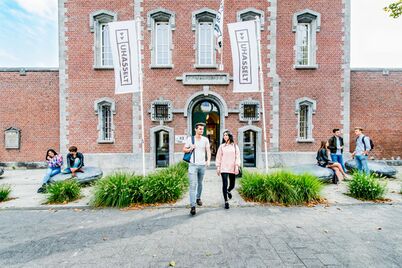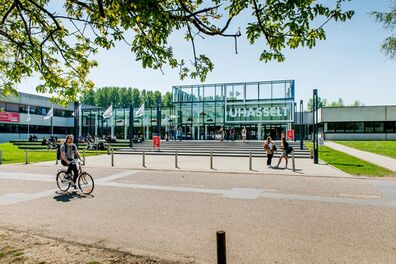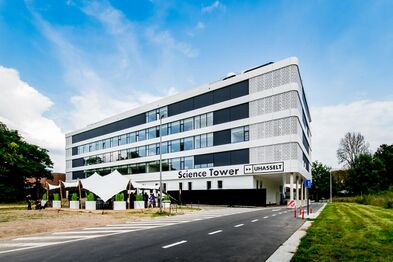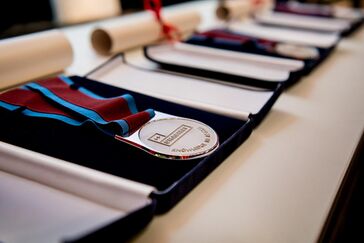Organization:Hasselt University
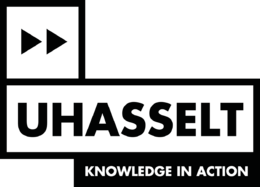 | |
| Motto | 'Knowledge in Action' |
|---|---|
| Established | 1971 (UHasselt since 2005) |
| Rector | Bernard Vanheusden (2020 - present) |
Administrative staff | 1,691 (September 2023) |
| Students | 7,065 (October 2023) |
| Location | Hasselt and Diepenbeek , Belgium |
| Website | https://www.uhasselt.be/en |
Hasselt University (Dutch: Universiteit Hasselt or UHasselt) is a public research university with campuses in Hasselt and Diepenbeek, Belgium. It has more than 7,000 students and 1,700 academic, administrative and technical staff (2023). The university was officially established in 1971 as the Limburg Universitair Centrum (LUC) and changed its name to Hasselt University in 2005.
UHasselt is ranked 35th out of 605 in the 2023 Times Higher Education ranking of universities younger than 50 years. In the European Commission's U-Multirank 2022, UHasselt scores a top ten overall result, with fifteen excellent indicators.
Hasselt University has an extensive regional, national and global network, fostering collaboration in education, research and innovation.
As of October 2020, Rector of Hasselt University is Prof. Bernard Vanheusden. Vice-Rector for Education is Prof. Wanda Guedens, Vice-Rector for Research Prof. Ken Haenen.
History
Establishment and start
UHasselt/LUC was official established by law in May 1971. In September 1973, the first academic year followed with around 320 students and six (undergraduate) programmes (Mathematics, Physics, Chemistry, Biology, Dentistry and Medicine).
Growth
In the ensuing decades, Hasselt University went through an enormous transformation. In 1991, the Limburg Business School (EHL) was transformed into the university's third faculty (Faculty of Applied Economics, presently Business Economics). The curriculum was expanded to include Transportation Sciences (2004), Law (2008), Architecture, Interior Architecture, Engineering Technology, Rehabilitation Sciences (2013) and Commercial Sciences (2015). In 2022, five additional programmes were launched: Social Sciences, Materiomics, Nursery and Midwifery, Healthcare Engineering and Engineering Technology: Computer Science.
Partnerships
In 2001, UHasselt/LUC and Maastricht University founded the Transnational University Limburg (tUL) – an international partnership involving two universities in two countries. tUL offers several programmes: Computer Science, Statistics, Biomedical Sciences and Law (a collaboration between tUL and KU Leuven). In 2003, UHasselt/LUC and university colleges PHL and XIOS (presently, PXL University College) formed the Limburg Association of Higher Education, or AUHL. The Association eyes the further development of higher education and scientific research in the Region.
In 2022, Hasselt University joined the EURECA-PRO European University Alliance. The network enables students and staff to study, teach and research in the field of responsible consumption and production. The long-term ambition of UHasselt and its partners in Austria, France, Germany, Greece, Poland, Romania and Spain, is to become the European hub for education and research in sustainability.
Name change
In 2005, LUC was renamed Hasselt University (or UHasselt).
From one to two campuses
In 2012, UHasselt opened a second campus in the city centre of Hasselt. It includes the Rectorate, the Law Faculty Building and the Old Prison (‘Oude Gevangenis’). The Old Prison is the university's main seat as well as the place where new students must register. Campus Hasselt also includes the Refugiehuis and Witte Kazerne, located in the Maastrichterstraat.
Rectors of Hasselt University
Rectorial elections at UHasselt take place every four years. All members of the faculty and school boards are eligible to vote (including student representatives). As highest decision-making body, the board of governors officially appoint the new rector. Over the past decades, Hasselt University has had four rectors (including current Rector Vanheusden):
- 1972–1988: Louis Verhaegen
- 1988–2004: Harry Martens
- 2004–2020: Luc De Schepper
- 2020–present: Bernard Vanheusden
Campuses and main buildings
Campus Diepenbeek
Campus Diepenbeek (75 hectares) is located in the ‘green belt’ near Hasselt. The campus is home to several research institutes, incubators and spin-offs. The student restaurant, University Library, class rooms and auditoriums are located in Main Building D. Other notable campus buildings are the Science Tower (with laboratories for education and research in chemistry and physics) and the Application Centre for Concrete and Construction (ACB²).
Campus Hasselt
Campus Hasselt (2 hectares) consists of the Rectorate (with the Rector's Office), the Faculty of Law and the Old Prison. The almost 200-year-old building has a restaurant, two auditoriums and former prison cells turned into study rooms. The Student Service Centre, where enrolment of new students takes place, is also located in the Old Prison Building.
The Offices of the Rector and Administrators are located on walking distance, at the sixteenth-century Refugiehuis (once a house of refuge for the Herkenrode Abbey's beguines). The adjacent Witte Kazerne ('White Barracks') is home to some central administration offices and the Transportation Research Institute as well as the School of Transportation Sciences.
Faculties, Schools and research institutes
Faculties and Schools
UHasselt has seven Faculties and three Schools, offering 18 Bachelor and 34 Master programmes in total (including 5 English-taught programmes):
- Architecture and Arts
- Business Economics
- Engineering Technology
- Law
- Medicine and Life Sciences
- Rehabilitation Sciences
- Sciences
- School of Transportation Sciences
- School of Educational Studies
- School for Social Sciences
Research institutes and centres
UHasselt has four research institutes covering the entire research spectre (from fundamental research to applied research to valorisation):
- Biomedical Research Institute (BIOMED)
- Centre for Environmental Sciences (CMK)
- Data Science Institute (DSI)
- Institute for Materials Research (imo-imomec)
There are also three research centres:
- Limburg Clinical Research Center (LCRC)
- Transportation Research Institute (IMOB)
- Expertise Centre for Digital Media (EDM)
Student life
Student Council
Each academic year, UHasselt students elect a Student Council (StuRa), consisting of fourteen members from the different Faculties and Schools. These representatives take part in several decision-making bodies, including the Board of Governors and the Educational Council.
Student Associations
UHasselt has a rich student life, with several Student Associations:
- Ambifaarke (student orchestra)
- ASG (Engineering Technology)
- BeMSA Hasselt (Belgian Medical Student Association)
- Biomedica (Biomedical Sciences)
- CCG (Christian Campus Community)
- Commeatus (Transportation Sciences)
- DIP's (Chemistry and Biology)
- ELSA Hasselt (European Law Students’ Association Hasselt)
- ESN Hasselt (Erasmus Student Network)
- Filii Lamberti (Mathematics, Physics and Computer Science)
- Hermes (Economics)
- JOSS (Joint Organisation of Statistics Scholars)
- Junior Consulting (association fostering entrepreneurial skills)
- Miezerik (Medicine)
- Themis (Law)
- Rekinea (Rehabilitation Sciences)
- Humanitas (Social Sciences)
Academic life
Opening academic year
The formal opening of the academic year traditionally takes place in the penultimate week of September. The day starts with the Procession of Professors in the centre of Hasselt and a toast by the Mayor at City Hall. In the afternoon, a ceremony with speeches and music is held.
Foundation Day
Hasselt University celebrates its Foundation Day on May 28 (the day when the university was established by law, in 1971). To mark the occasion, honorary doctorate degrees are awarded to individuals for outstanding contributions made to a specific field and/or to society in general. Each honorary doctor receives a diploma and the University Medal. Since 2022, UHasselt also hands out the Foundation Day Honorary Award to an organisation.
In the past decades, numerous internationally renowned scientists, artists, architects, journalists and entrepreneurs from around the world joined the circle of honorary doctors of Hasselt University:
- Queen Mathilde
- Erika Vlieghe
- Jordi Sunyer
- Anne Larigauderie
- Annemarie Mol
- Christian Grönroos
- Stella Nkomo
- Dirk De Wachter
- Te Gek!? (Foundation Day Honorary Award 2022)
- Jan Rabaey
- Dipak Kalra
- William Cleveland
- Jane Goodall
- Arne Akbar
- Franklin A. Tuitt
- Alarcos Cieza
- Patricia Moore
- Clarice Garcia Borges Demétrio
- Ronnie Leten
- Bruno Vanobbergen
- Thomas A. Louis
- John Goddard
- Serge Abiteboul
- Harry Timmermans
- Susanne Baer
- Ayodhya Tiwari
- Yehuda Shoenfeld
- Joëlle Tuerlinckx
- Jos Delbeke
- Morten Bennedsen
- Mariana Mazzucato
- Stijn Bijnens
- Martha Nussbaum
- Jean-Marie Tarascon
- Paul Stoffels
- Kunlé Adeyemi
- John Lloyd Provis
- Emmanuel de Merode
- Richard D. Bardgett
- Jeremy Rifkin
- Thomas Friedman
- S. Tamer Cavusgil
- Christine Van Broeckhoven
- Bijoy Jain
- Luc Deleu
- Henry Chesbrough
- Lieven Maesschalck
- Michael Braungart
- Heinz Klug
- Richard Friend
- Jean-Jacques Cassiman
- John G. F. Cleland
- Silvana Sciarra
- Wil van der Aalst
- Ramesh Raskar
- Johny Vansevenant
- Mahmoud F. Fathalla
- Marc Bossuyt
- Monder Ram
- Bernardo Secchi
- Ignace Schops
- Andrew B. Holmes
- Richard E. Palmer
- Koen Vanmechelen
- Michael Rowe
- Panamarenko
- Robert Mendelsohn
- Michael Grätzel
- Susan Trumbore
- Alain Hubert
- Norman Breslow
- Ingrid Daubechies
- Piet Lemstra
- Lawrence Steinman
- Alan Thompson
- Baruch Lev
- Gerard Unger
- Shalom Hakkert
- Christopher Alexander
- Axelle Red
- Polly Matzinger
- Cees Dekker
- Kathleen Eisenhardt
- Frank De Winne
- Tom Jovin
- Yuri Gurevich
- David Montgomery
- Michael Berridge
- Harold Kroto
- Roger Langenaken
- David Cox
- Erwin Neher
- Hans Mohr
- Georges Köhler
See also
- Science and technology in Flanders
- Limburg Science Park
- University Foundation
- Flanders Interuniversity Institute of Biotechnology (VIB)
- Interuniversity Microelectronics Centre (IMEC)
References
External links
| Wikimedia Commons has media related to Hasselt University. |
- Hasselt University
- More information about higher education in Flanders/Belgium (in English)
- Find an officially recognised programme of this institution in the Higher Education Register
[ ⚑ ] 50°55′31″N 05°23′27″E / 50.92528°N 5.39083°E
 |
